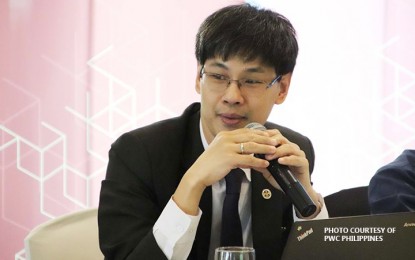
Finance Undersecretary Karl Kendrick Chua
MANILA -- The Department of Finance (DOF) said the proposed incentives regime under Senate Bill (SB) No. 1357, or the Corporate Income Tax and Incentives Reform Act (CITIRA), once approved by the Congress, will keep the Philippines highly competitive compared with other countries in the Association of Southeast Asian Nations (Asean) region that also offer tax perks to investors.
In response to recent news that Thailand is offering its tax incentives to high-tech firms relocating from China, Finance Undersecretary Karl Kendrick Chua said the Philippines’ incentive offerings under CITIRA are “at the very least at par with, if not more generous and competitive compared to, those of Thailand.”
“There is a recent report that Thailand is offering a 50-percent income tax discount for five years to qualified high-tech firms, subject to conditions such as a minimum level of investment of 1 billion baht (or around USD32.7 million) and investment commencement in 2021. Relocating companies to Thailand will face a 10 percent tax on net income, instead of the regular 20 percent tax,” he said.
Chua said aside from the Philippines’ talented English-speaking workforce and young robust market, which are the main attractions to investors, the competitive tax incentive system under CITIRA will help draw in investments that are coming out of China as a result of the US-China trade war.
He added that under the Senate version of CITIRA, there are two options for companies seeking to apply for incentives.
“The first option is to avail of an income tax holiday (ITH) for two to four years, followed by a special tax rate on gross income for three to four years. The special rate will be increased from the current 5 percent of gross income to 8 percent in 2020, 9 percent in 2021, and 10 percent in 2022," he said.
Chua said enjoyment of the ITH and special rate will initially be granted for five to eight years, and can be extended by up to 12 years total, which is longer than the five-year period offered by Thailand.
This special tax regime will still be in lieu of all national and local taxes, allowing investors to push down overall business costs and meet bottom line commitments, he said.
“In fact, the 8 percent tax on gross income is almost an 8 percent tax on net income as many firms no longer report indirect cost to take advantage of the incentives system to lower their tax due,” he added.
To promote ease of doing business, Chua further said investment promotion agencies (IPAs) shall remain as one-stop-shops for investors.
“The second option for investors is to avail of the regular corporate income tax (CIT) rate with generous enhanced deductions for five to eight years, which may be extended by three or four years at a time for a total duration of 12 years,” Chua said.
He said the enhanced deductions under SB 1357 include up to 50-percent additional deduction on power expense, which is a new provision not found in earlier versions of the bill; up to 50-percent additional deduction on labor expense to promote job creation; up to 100-percent additional deduction on research and development (R&D) to promote innovation; and up to 50 percent additional deduction on domestic input expense to promote domestic supply chains.
Also included in the Senate version of CITIRA, he said, are the deduction for reinvestment allowance to the manufacturing industry (up to 50 percent of reinvestment) to promote quicker expansion and job creation; depreciation allowance of the assets acquired for the entity’s production of goods and services (additional 10 percent for buildings and 20 percent for machinery); and enhanced net operating loss carry over (NOLCO).
“Many of these additional deductions are not present in the current incentive system in the Philippines and in other countries. CITIRA precisely includes them to directly address some of the constraints in doing business in the Philippines while making our proposed incentive system under CITIRA more competitive than our neighbors,” he said.
Chua said CITIRA also includes a provision where the President can approve special incentives if the current package is not sufficient to attract the largest investors.
“That is how we aim to attract them when CITIRA is passed," he added.
Chua also noted the recent news that foreign direct investment (FDI) pledges in the Philippines more than doubled last year, compared to 2018.
Based on the latest data from the Philippine Statistics Authority (PSA), PHP390 billion in FDI pledges were approved in 2019, versus the PHP183 billion recorded in 2018.
This was mainly because of the performance of the Board of Investments (BOI), which despite offering only time-bound incentives, accounted for 86.1 percent of the pledges last year.
“The strong performance of FDI pledges in 2019 is a positive signal that the international community continues to regard the Philippines as one of the prime investment destinations in Asia. The sooner CITIRA is passed, the sooner these investments will materialize,” he said.
Senate ways and means committee chairperson, Sen. Pia Cayetano had earlier sponsored the measure in the Senate plenary.
She described CITIRA as “a fair deal for all” and “the best deal for Filipinos” in her sponsorship speech.
The measure seeks to reduce the CIT rate in the country, which is currently the highest in the Asean region, and reform the fiscal incentives system to make it more fair, efficient, and accountable.
CITIRA was among the priority bills endorsed by President Rodrigo Duterte in his 4th State-of-the-Nation Address (SONA) last July 2019.
In his SONA speech, President Duterte said, “It will energize our MSMEs (micro, small and medium enterprises) and encourage them to expand their business. The MSMEs hold the promise of raising a lot of Filipinos (from poverty).” (PR)
